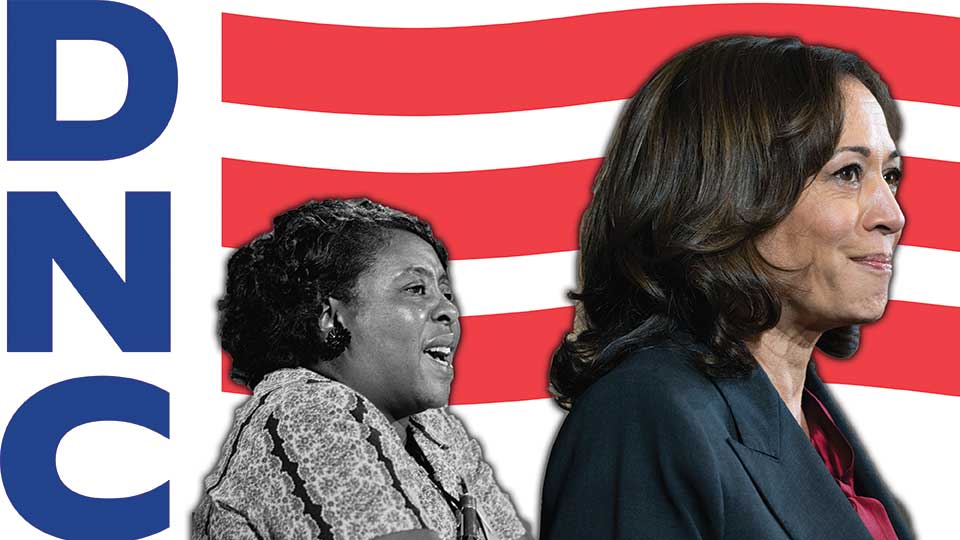
Fannie Lou Hamer took her place at the table, and now Kamala Harris is about to take her place at the head of the table. | Photos: AP / Graphic design: PW
The organizing power of black women took center stage on the first day of the 2024 Democratic National Convention (DNC), as the Black Caucus used its first official session to host a panel on black women in leadership and the upcoming presidential election. With Vice President Kamala Harris set to be the party’s first black woman official presidential nominee, “Seat at the Table” attendees emphasized the critical role black women continue to play in the political arena and what it will take to get the Harris-Walz presidential pairing into the White House.
Moderated by Rev. Shavon Arline-Bradley, President of the National Council of Negro Women (NCNW), the panel featured Stefani Brown James, co-founder of The Collective PAC, Jahana Hayes, Representative from Connecticut’s 5th Congressional District, Dr. Donna Marie Christian-Christensen, former Representative from the U.S. Virgin Islands at-large, Grace Carrington, Delegate from Florida, and Waikinya JS Clanton, Director of the Mississippi office of the Southern Poverty Law Center.
The power of black women is deeply intertwined with the history of the United States. Although black women were involved in the fight for the passage of the 19th Amendment in 1920, which gave women the right to vote and the opportunity to hold political office, they faced racist terror at the ballot box and were denied their right to vote. That’s why black women leaders of the civil rights movement like Fannie Lou Hamer and Diane Nash played a crucial role in the passage of the Voting Rights Act of 1965, which made voting easier for black women and other marginalized groups.
Since then, Black women have used their collective power to exercise their right to vote and to protect their rights and those of others so that their voices are heard on the ballot. Yet, as many Black women organizers repeatedly point out, this collective power is often taken for granted and underestimated by many—both inside and outside the progressive movement.
According to the Higher Heights for America PAC, 16 million black women are eligible to vote and 67 percent are registered. 94 percent supported Hillary Clinton in the 2016 presidential election. 96 percent voted for Obama in 2008 and 2012, giving him the margin he needed to win two terms. 90 percent of black women voted for Joe Biden and Harris in 2020, securing the administration’s victory.
Yet, despite making up 6.8 percent of the population—and having one of the highest rates of voter turnout—black women make up just 5.4 percent of Congress. There are currently 27 members of the House who identify as black women, and only one in the Senate. Vice President Harris was only the second black senator in U.S. history and the first black woman (and woman in general) to hold elected federal office. There has never been a black female governor.
When answering questions about black women’s leadership and the future of the country, panelists clearly considered both the past and the present.
When asked how Black women will lead in 2024, Hayes jokingly replied, “However we want to,” while addressing the misogynoir — the combined force of racism and misogyny against Black people — she has endured during her time in office.
Hayes noted that black women are often the most impacted by the laws passed by those in power. “(As a black woman) I have been a victim of these policies myself, so I don’t need anyone to tell me how to behave (as a leader),” she explained, adding, “We need to normalize black excellence in positions of power.”
Dr. Christian-Christensen highlighted historic working-class struggles in which black women have been at the forefront. “Black women have bled in every revolution (we have been involved in),” she explained, pointing to the story of the Coaling Ladies of St. Thomas, where in 1823, poorly paid black women in the Virgin Islands who had the physically demanding job of carrying heavy buckets of coal to and from the mines organized a strike for better pay – and won.
Brown added that black women are the prototype for community organizing. Brown mentioned the historic fundraising for the Harris-Walz campaign through Zoom calls to various groups of voters, pointing out that black women set in motion the chain of events that led to those calls.
Clanton echoed that statement, praising the 44,000 Black women who organized the first Zoom call after President Biden endorsed Harris, raising over $1 million for the presidential candidate in three hours.
“Nobody else will do that”
“If we (black women) don’t do it, no one else will,” Clanton said, explaining that this type of organizing happens not just around elections, but continuously.
Brown added that it is time for people to “get off the couch and Zoom” and take to the streets with black women to talk to potential voters.
And when it came to potential voters, the danger of voter suppression was ever-present for the panel.
Florida Rep. Carrington explained that while voter turnout remains strong in her state, Governor Ron DeSantis – whom she referred to as “De-Satan” – is constantly trying to “change the rules” to suppress Democratic turnout. DeSantis, like other politicians in Republican-controlled states, has enacted several measures to make it harder for people to cast their ballots – particularly voters from communities of color, and especially Black voters.
Clanton pointed out that the infamous Project 2025 aims for even greater voter suppression and that voters need to pay attention to what is happening in their state legislatures.
“And don’t assume that voter suppression only happens in the Deep South,” Hayes said, pointing out that Connecticut only recently began allowing early voting, making it one of the last states in the country to do so. She explained that elections are important: “The people who make the rules can change the rules. There is a fear that if we are allowed to vote, we might vote for the right person.”
“This presidential election will be won by a narrow margin. Black voter turnout will make the difference,” said moderator Arline-Bradley. Given that eligible voters in key states like Georgia make up a significant portion of the black electorate ahead of the November election, that statement seems accurate.
As the 60th anniversary of Freedom Summer—the 1964 campaign to register as many African-American voters as possible in Mississippi—panelists reflected on the historical role of black women in the fight for voting rights and the current struggle for democracy, noting that it is high time for black women to assume more prominent leadership roles.
The Harris-Walz campaign has brought resistance to Black women in leadership to the forefront as Black women across the country watch the racist and sexist attacks against the Vice President in real time. As Donald Trump and his MAGA supporters use terms like “DEI hiring” to question Harris’ qualifications, try to claim she slept her way to the top, and brazenly attempt to sow doubt about her Black identity — it seems critical for the progressive movement to advocate for Black women in leadership and combat such tactics.
“Fannie Lou Hamer took her seat at the table. (Black women) shared the plan to organize and win. We won elections for everyone else,” Clanton said. “It’s time to win for ourselves.”
Brown advised progressive black women to “embrace their blackness because it is their superpower.”

